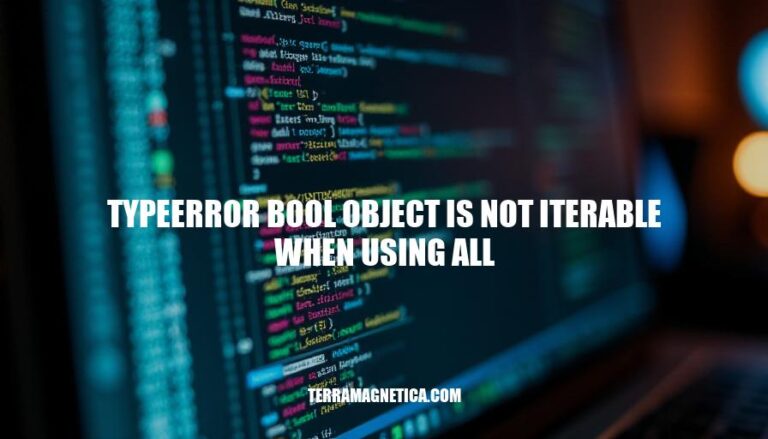


In Python programming, encountering the error “TypeError: ‘bool’ object is not iterable when using all” typically means that a boolean value (True or False) is being used in a context where an iterable (like a list or tuple) is expected. This error is relevant because it highlights a common mistake in code logic, where a boolean is mistakenly passed to functions like all(), which require iterables to check conditions across multiple elements. Understanding and resolving this error is crucial for ensuring that your code runs smoothly and correctly processes data.
The error “TypeError: ‘bool’ object is not iterable” occurs when you try to iterate over a boolean value (True or False) instead of an iterable object like a list, tuple, or string. This often happens if a variable expected to be an iterable is mistakenly assigned a boolean value.
The all() function in Python checks if all elements in an iterable are True. It returns True if all elements are truthy, and False otherwise. If the iterable is empty, all() returns True. Here’s a simple example:
my_list = [True, True, False]
result = all(my_list) # Returns False because not all elements are True
If you mistakenly pass a boolean to all(), like this:
result = all(True) # Raises TypeError: 'bool' object is not iterable
You’ll get the “TypeError: ‘bool’ object is not iterable” error because True is not an iterable.
Here are common scenarios that lead to the TypeError: 'bool' object is not iterable when using the all function:
Passing a Boolean Directly:
result = all(True) # Raises TypeError
Boolean in a List:
my_list = [True, False, True]
result = all(my_list) # This is correct
Variable Reassignment:
my_list = [1, 2, 3]
my_list = True # Reassigned to a boolean
result = all(my_list) # Raises TypeError
Function Returning Boolean:
def check_values():
return True # Function returns a boolean
result = all(check_values()) # Raises TypeError
Conditional Assignment:
my_list = [1, 2, 3] if some_condition else True
result = all(my_list) # Raises TypeError if some_condition is False
Using Boolean in Membership Test:
my_bool = True
result = all(x in my_bool for x in [1, 2, 3]) # Raises TypeError
These scenarios typically involve mistakenly passing a boolean value to the all function, which expects an iterable.
Here’s a specific example where the TypeError: 'bool' object is not iterable occurs when using all:
# Incorrect usage leading to TypeError
my_bool = True
result = all(my_bool) # TypeError: 'bool' object is not iterable
In this example, my_bool is a boolean value (True), and passing it to all causes the error because all expects an iterable, not a boolean.
To fix this, you should pass an iterable to all:
# Correct usage
my_list = [True, True, False]
result = all(my_list) # Returns False
In this corrected example, my_list is a list of boolean values, which is a valid input for all.
Identify the Error Source:
TypeError occurs in your code.Check Variable Types:
all() function is an iterable (e.g., list, tuple, set).print(type(variable)) to verify the variable type.Correct Variable Assignment:
my_list = [True, False, True] # Correct
my_list = True # Incorrect
Ensure Proper Usage of all():
all() expects an iterable. Ensure you are not passing a boolean directly.result = all([True, False, True]) # Correct
result = all(True) # Incorrect
Debug and Test:
Following these steps should help you troubleshoot and resolve the TypeError: 'bool' object is not iterable when using all().
Here are some best practices to avoid encountering the TypeError: 'bool' object is not iterable when using all in Python:
Check Variable Types: Ensure the variable passed to all is an iterable (e.g., list, tuple, set) and not a boolean.
if isinstance(my_var, bool):
# Handle the boolean case
else:
result = all(my_var)
Avoid Reassigning Iterables to Booleans: Be cautious not to accidentally reassign an iterable to a boolean value.
my_list = [1, 2, 3]
# Avoid: my_list = True
Use Explicit Iterables: Directly pass an iterable to all.
my_list = [True, True, False]
result = all(my_list)
Validate Inputs: Before using all, validate that the input is an iterable.
def is_iterable(obj):
try:
iter(obj)
return True
except TypeError:
return False
if is_iterable(my_var):
result = all(my_var)
Debugging: Use print statements or a debugger to trace where a boolean might be incorrectly assigned.
print(type(my_var)) # Should be an iterable type
Following these practices will help you avoid the TypeError and ensure your code runs smoothly. Happy coding!
When encountering the ‘TypeError: bool object is not iterable‘ while using the `all()` function in Python, it’s essential to understand that this error occurs when a boolean value is passed to `all()`, which expects an iterable as input.
To resolve this issue, you should ensure that the variable passed to `all()` is indeed an iterable (e.g., list, tuple, set) and not a boolean.
Proper error handling in Python is crucial for debugging and resolving issues like this. By following these practices, you’ll be able to identify and fix the problem efficiently, ensuring your code runs smoothly and accurately.